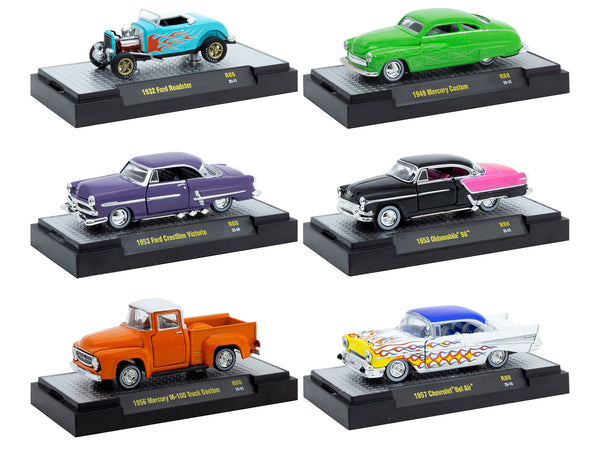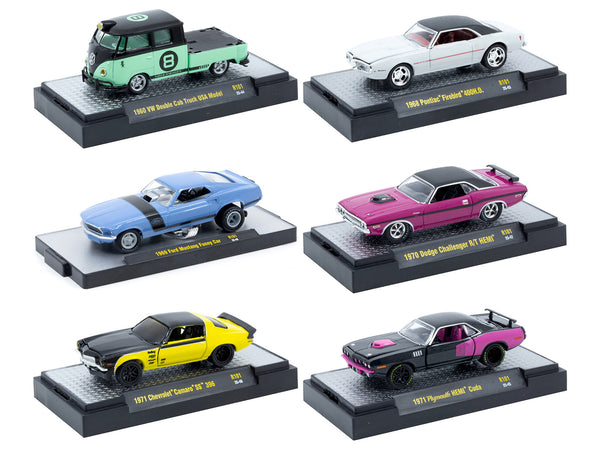
Inside Enzo Ferrari's World: Unveiling His Accomplishments and Failures in Sports Cars
Related Products
Share
Enzo Ferrari remains a towering figure in automotive history, renowned for his indelible impact on the world of sports cars and racing. As the founder of one of the most prestigious Italian car manufacturers, Ferrari's legacy is a testament to both remarkable accomplishments and notable failures. Under his visionary leadership, the Ferrari brand soared to unprecedented heights, establishing a legendary racing legacy and producing sports cars that continue to captivate enthusiasts worldwide. However, Enzo's journey was not without its challenges; his relentless pursuit of excellence often led to setbacks that shaped his story. In this exploration, we delve into the compelling life of Enzo Ferrari, unraveling the intricacies of his triumphs and tribulations within the realm of sports cars.
Early Life and Career Beginnings
Childhood and Passion for Cars
Enzo Ferrari was born on February 20, 1898, in Modena, Italy. From a young age, he exhibited an intense fascination with automobiles, a passion that would shape his entire life. Growing up, Enzo was captivated by the burgeoning world of motor racing, drawing inspiration from early racing legends. The tragic death of his father and brother during the 1916 Italian flu pandemic intensified his resolve to pursue a career in the automotive industry. Despite the financial constraints his family faced, Enzo's relentless determination led him to seek out opportunities to immerse himself in the world of cars. His early experiences as a test driver and mechanic laid the foundation for his deep understanding of automotive engineering and racing dynamics. These formative years were crucial in shaping Enzo Ferrari's future endeavors, ultimately propelling him to become an iconic figure in automotive history.
Early Work in Automotive Industry
Enzo Ferrari's early career in the automotive industry began with modest roles that belied his future success. After World War I, he secured a position as a test driver for a small car manufacturer called Costruzioni Meccaniche Nazionali (CMN). His talent and determination soon caught the attention of Alfa Romeo, where he joined as a race car driver in 1920. His time at Alfa Romeo was pivotal; he not only honed his racing skills but also gained invaluable experience in car engineering and team management. Enzo quickly moved up the ranks, eventually managing Alfa Romeo's racing team. This period was instrumental in shaping his vision for creating his own car manufacturing company. His early career experiences provided Enzo with a comprehensive understanding of the automotive industry, from technical intricacies to the competitive nature of racing, setting the stage for the founding of Ferrari.
Founding Scuderia Ferrari
In 1929, Enzo Ferrari took a significant step towards realizing his vision by founding Scuderia Ferrari in Modena. Initially, Scuderia Ferrari was not a car manufacturer but a racing team that prepared and fielded Alfa Romeo cars for competition. Enzo's expertise in racing and team management quickly proved effective, as Scuderia Ferrari became a formidable presence in the racing world. The team's success bolstered Enzo's reputation, laying the groundwork for future endeavors. Scuderia Ferrari served as a springboard for Enzo's ambitions, providing him with the knowledge, experience, and financial backing necessary to eventually produce his own line of cars. Despite the challenges and financial constraints of the era, Enzo's relentless pursuit of excellence drove the team to numerous victories. This early success marked the beginning of Ferrari's storied racing legacy, setting the stage for the brand's evolution into a leading name in sports cars and motorsport.
Ferrari's Major Accomplishments
Breakthrough Sports Car Models
Enzo Ferrari's relentless pursuit of automotive excellence led to the creation of several groundbreaking sports car models that solidified Ferrari's reputation. Among these, the Ferrari 250 series stands out as a pivotal achievement. Introduced in the 1950s, the 250 GT models were renowned for their elegant design, powerful performance, and engineering innovation. The 250 GTO, launched in 1962, became an icon in the automotive world, known for its racing prowess and limited production run, making it one of the most sought-after collector cars. Another significant model was the Ferrari 365 GTB/4, commonly known as the Daytona, which debuted in 1968. Its blend of speed, style, and sophistication captured the imagination of car enthusiasts worldwide. These models not only showcased Enzo's commitment to pushing the boundaries of design and engineering but also cemented Ferrari's status as a leader among Italian car manufacturers in the sports car segment.
Dominance in Formula One Racing
Ferrari's dominance in Formula One racing is a testament to Enzo Ferrari's commitment to motorsport excellence. Under his leadership, Ferrari became a powerhouse in the F1 circuit, amassing numerous championships and accolades. The team's first significant triumph came in 1952 when Alberto Ascari secured the World Championship title, marking the beginning of a formidable legacy. Throughout the 1960s and 1970s, Ferrari continued to build on this success, with legendary drivers like Niki Lauda and Jody Scheckter contributing to the brands storied history. Ferrari's consistent innovation in car design and engineering, coupled with strategic team management, allowed the team to remain competitive over decades. This success on the racetrack not only enhanced the brand's prestige but also fueled the development of its road cars, as technological advancements in F1 often found their way into consumer models. Ferrari's achievements in Formula One remain a crucial pillar of its racing legacy.
Innovations in Automotive Engineering
Enzo Ferrari's impact on automotive engineering is marked by a series of pioneering innovations that set new standards in the sports car industry. One of Ferrari's key technological advancements was the introduction of the V12 engine, which became synonymous with the brand's high-performance vehicles. This engine not only delivered unparalleled power and speed but also set a benchmark for engineering excellence in the automotive world. Additionally, Ferrari was at the forefront of incorporating aerodynamic principles into car design. By utilizing wind tunnels and advanced materials, Ferrari optimized vehicle performance, enhancing both speed and handling. The brand's commitment to innovation also extended to the use of lightweight materials, such as aluminum, in car construction, improving fuel efficiency and agility. These engineering breakthroughs were not confined to racing; they were integrated into Ferrari's consumer vehicles, providing drivers with an unmatched driving experience. Enzo Ferrari's legacy in automotive innovation continues to influence car manufacturers worldwide.
Notable Failures and Challenges
Business Struggles and Setbacks
Despite his many accomplishments, Enzo Ferrari faced significant business struggles and setbacks throughout his career. One major challenge was the financial instability that plagued the company in its early years. The high costs associated with racing and car production often strained resources, pushing Ferrari to the brink of insolvency. The demand for continuous innovation in a fiercely competitive industry also added pressure on the companys finances. Additionally, internal conflicts within the management team sometimes hindered strategic decision-making. A notable example was the infamous "palace revolt" in the early 1960s, when several key executives and engineers left the company due to disagreements with Enzo's management style. These disruptions impacted Ferrari's operations and forced Enzo to reassess and restructure his team. Despite these setbacks, Ferrari's resilience and determination enabled him to navigate these challenges, ultimately leading to the brand's enduring success in the automotive industry.
Racing Failures and Controversies
Racing, while a cornerstone of Ferrari's legacy, was not without its fair share of failures and controversies. Throughout Enzo Ferrari's tenure, the team experienced several high-profile setbacks on the track. Notably, the 1962 and 1963 Formula One seasons were particularly challenging, marked by mechanical failures and fierce competition, which prevented Ferrari from clinching the championship titles. These racing disappointments were compounded by controversies, such as the tragic 1957 Mille Miglia incident where a Ferrari car crash resulted in fatalities, leading to public outcry and legal challenges. Additionally, Enzo's uncompromising leadership style occasionally led to tensions with drivers and team members, impacting team morale and performance. These controversies and failures tested Ferrari's resilience but also drove Enzo to continuously improve his cars' engineering and team strategies. Despite these challenges, Ferrari's commitment to racing excellence persevered, ultimately reinforcing its status as a dominant force in motorsport history.
Personal and Professional Losses
Enzo Ferrari's journey was marked by profound personal and professional losses that deeply influenced his life and work. The death of his father and brother during his youth had a lasting emotional impact, driving his determination to succeed in the automotive industry. In his professional life, Enzo faced the devastating loss of his first born, Alfredo "Dino" Ferrari, in 1956 to muscular dystrophy. Dino's death was a significant blow, as Enzo had hoped his son would continue the Ferrari legacy. This personal tragedy spurred Enzo to honor Dino's memory, leading to the creation of the iconic Dino series of cars, which became a lasting tribute to his son. Professionally, the departure of key team members during the "palace revolt" in the 1960s was a significant setback, forcing Enzo to rebuild his team and strategy. These personal and professional losses shaped Enzo's character and fueled his relentless pursuit of excellence and innovation.
Ferrari's Legacy in Automotive History
Impact on Italian Car Manufacturers
Enzo Ferrari's influence extends beyond his own brand, impacting the broader landscape of Italian car manufacturers. Ferrari set a high bar for performance, design, and innovation that inspired other Italian automakers to pursue excellence. His commitment to integrating cutting-edge technology and design into sports cars established Italy as a leader in the luxury and performance car segments. Brands such as Lamborghini and Maserati were motivated by Ferrari's success, fueling a competitive environment that drove the industry forward. Enzo's focus on racing not only enhanced Ferrari's reputation but also highlighted the potential of motorsport as a proving ground for automotive advancements. This emphasis on racing prowess and engineering excellence became a hallmark of Italian car manufacturers, influencing their strategies and product offerings. Enzo Ferrari's legacy is reflected in the enduring reputation of Italian cars as symbols of sophistication, speed, and innovation, continuing to captivate automotive enthusiasts worldwide.
Lasting Influence on Sports Cars
Enzo Ferrari's legacy has left an indelible mark on the world of sports cars, setting standards that continue to influence the industry today. His vision of combining performance with aesthetic appeal created a new paradigm for what sports cars could achieve. Ferrari's commitment to engineering excellence and design innovation has inspired countless manufacturers to prioritize both speed and beauty in their vehicles. The brand's iconic models, such as the Ferrari 250 GTO and the Ferrari F40, have become benchmarks for performance and desirability, influencing generations of car designers and engineers. Enzo's emphasis on the driver experiencebalancing power, handling, and comforthas become a guiding principle in sports car development. This legacy has ensured that sports cars remain not just modes of transportation but also symbols of prestige and passion. Enzo Ferrari's influence endures, as manufacturers continue to strive for the perfect fusion of technology and artistry in the world of sports cars.
Preservation of Racing Legacy
Enzo Ferrari's dedication to racing left a profound legacy that remains a cornerstone of the Ferrari brand. His insistence on excellence and competitiveness on the track has been preserved through Ferrari's continued success in motorsport, particularly in Formula One. This ongoing commitment to racing excellence not only honors Enzos vision but also serves as a testament to the brand's enduring heritage. Ferrari's racing legacy is reflected in its consistent innovation and adaptation in response to the evolving motorsport landscape. The brand's investment in developing cutting-edge racing technology ensures that Ferrari remains at the forefront of the industry. Furthermore, Ferrari's commitment to nurturing new talent through its driver academy underscores its role in shaping the future of motorsport. Enzo Ferrari's legacy lives on in every race, as the brand continues to honor his passion for speed and competition, cementing its status as a legendary name in automotive history.
Enzo Ferrari's Enduring Influence
Cult Status Among Car Enthusiasts
Enzo Ferrari has achieved a cult status among car enthusiasts, symbolizing the pinnacle of automotive passion and achievement. His name evokes images of unparalleled craftsmanship, performance, and the thrill of racing. Ferrari cars are not just vehicles; they are expressions of artistry and engineering excellence that resonate deeply with fans worldwide. This deep connection is fueled by the brand's storied history, marked by iconic models and legendary victories on the racetrack. Enthusiasts admire not only the cars themselves but also the philosophy and relentless pursuit of perfection that Enzo embodied. Collectors and fans are drawn to Ferrari's unique blend of tradition and innovation, with each model celebrated as a masterpiece. The brand's ability to evoke emotion and inspire dedication among its followers has resulted in a passionate global community. Enzo Ferrari's legacy endures, as his creations continue to captivate and unite car enthusiasts in their shared appreciation for the Ferrari marque.
Representation in Popular Culture
Enzo Ferrari's legacy extends beyond the automotive world into popular culture, where his name and brand have become synonymous with luxury and high performance. Ferrari cars frequently appear in films, television shows, and music videos, symbolizing status, speed, and sophistication. Iconic movies like "Ferris Bueller's Day Off" and "Ford v Ferrari" highlight the allure and mystique surrounding Ferrari vehicles, further embedding the brand into the public consciousness. Moreover, the Ferrari logo, with its prancing horse, has become a global emblem of prestige and aspiration, recognized even by those outside car enthusiast circles. This cultural representation solidifies Ferrari's standing as more than just an automaker; it is a cultural phenomenon. Enzo Ferrari's influence permeates various aspects of entertainment, reflecting the broader impact of his contributions to automotive history and his lasting imprint on society's imagination and aspirations for excellence and elegance.
Continuing Evolution of Ferrari Brand
The Ferrari brand continues to evolve, building on Enzo Ferrari's foundational principles of performance, innovation, and design excellence. Today, Ferrari remains at the cutting edge of automotive technology, embracing advancements such as hybrid powertrains and electric vehicles while maintaining the core attributes that define its sports cars. Modern models like the SF90 Stradale and the Ferrari LaFerrari exemplify this blend of tradition and innovation, delivering unparalleled performance and efficiency. The brand also extends its influence through various lifestyle ventures, including branded merchandise and luxury experiences, further reinforcing its prestige. Ferrari's continued participation in Formula One ensures that it remains a leader in motorsport, constantly pushing the boundaries of automotive engineering. This ongoing evolution reflects Enzo Ferrari's enduring influence, as the brand adapts to new challenges and opportunities while staying true to its storied legacy. The Ferrari name continues to captivate and inspire, symbolizing the relentless pursuit of automotive excellence.





